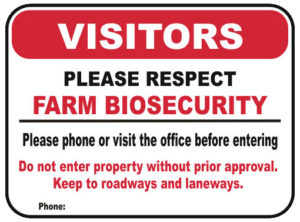Hi everyone, your favorite #agvocate is here to drop some disease prevention tips for Profitable farming. I understand that we are all beginning to adjust to this ‘new normal’ called Covid-19. Initially, when the pandemic swooshed in and lock-down measures were taken by the government, everybody wanted to ‘die’. Farmers especially encountered and still encounter a lot of problems ranging from logistics hikes and unavailability to poor pricing and post-harvest loss (i will talk more about how to prevent or totally avoid all of these in a later post).
Today, I want to discuss Biosecurity as a tool to prevent and control the occurrence of disease outbreaks on our farms. Did you even know that the novel coronavirus called ‘covid-19’ could have been avoided or better curtailed if the whole world had been ” Biosecurity-conscious”? well, the fact is, if hand washing, use of PPE, and other preventive measures had been our culture, we wouldn’t have been going through all of these today. This is applicable to our farms and management practices as well. As of June 2020, Nigeria lost 145,000 pigs to African Swine Fever (ASF) in Oke-Aro, West Africa’s largest pig farm estate alone.
The economic loss and psychological damage caused by disease outbreaks are beyond acceptable limits. In as much as we may not be able to totally eradicate disease occurrence, certain measures can be taken to prevent as much as possible, control and limit occurrence to the barest minimum level.
Biosecurity simply means the practices, procedures, and policies used to prevent the introduction and spread of disease-causing organisms (e.g., bacteria, viruses, fungi, parasites) as well as many invasive species (wild species and free rangers). Animal and crop diseases continue to be one of the greatest causes of economic loss for the industry, accounting for millions of dollars in annual losses to many animal producers. While some pathogens are well known, some other diseases are spread to previously unaffected areas. Disease outbreaks can occur rapidly and spread quickly, often resulting in high mortality rates. Being an Animal scientist and Aquaculture technical professional, I will use animals, predominantly fish as a point of discussion. However, Biosecurity is basically the same template for all farmers, revolving around “Prevention” and “Control”.
Why Biosecurity?
The major reasons why Biosecurity measures should be taken in, on, and around our farms are highlighted below.
•To Avert introduction of new or existent diseases
•To Reduce circulation of disease on the farm and other areas
•To Promote Animal/livestock health
•To Protect Economy, Investment and Reputation of Farm/Farmer/Country
•To Protect against new/novel diseases
•To ensure Food Safety and Human Health
Biosecurity Activation
The measures needed to keep a farm Biosecure depend on certain factors such as the nature of the facility, purpose of the facility (e.g., stocking, food fish), the species, and life stages reared. That is, there is no “one-size-fits-all” method of Biosecurity. In order to determine the Biosecurity measures needed, one needs to first identify risk areas on the facility and highlight the necessary preventive measures to obtain the greatest cost-benefit. The majority of preventive measures are inexpensive in comparison to the potential economic loss that can occur from mortality, decreased production, or the need for depopulation expected during or after a disease outbreak. Many of the procedures such as disinfection hand washing tanks, foot dips, shower sprays are also quickly implemented; while others may require some level or type of economic investment, depending on commercial size, etc. For example, dedicated quarantine equipment, rooms, and novel vaccines. Relate with your Animal health Scientist, Veterinarian, or Aquaculture Technical experts to identify risk factors and develop an effective Biosecurity plan for your facility. Once determined, ensure communication of measures to others involved with your farm such as workers, customers, delivery team, visitors.
Disease Transmission
There are several ways the disease can be transmitted in Organisms. Below are disease transmission methods in Fish.
Water sources
Fish can contact or spread disease through water which is their habitat; they breathe, eat and excrete in water. Contamination occurs from the urine, fecal deposits, reproductive fluids, and mucus of infected fish. The movement of this contaminated water during the transport of fish can spread pathogens to new locations.
Fomites
Fomites refer to inanimate objects that can transfer disease pathogens between rearing areas or production areas, and they become contaminated after contact with infected fish or contaminated water sources. The tricky aspect of this is that fomites are unavoidable items and equipment on your farm such as dragnets, scoop nets, plastic bowls or tanks, farm coveralls, footwear, vehicles, etc.
Direct contact
This is a common path of disease transmission in animals. It involves the transfer of disease-causing agents through contact with infected fish. The disease may be introduced through the skin, open wounds, mucous membranes, or gills. Infectious microorganisms can be found on the mucus layer of fish or skin lesions. Pathogens could also be spread from female fish to her eggs; this is known as vertical transmission.
Ingestion
Disease pathogens can also be transmitted orally via consumption of contaminated feed, infected live or frozen fish, or cannibalism of dead or dying fish from the same tank. This is very peculiar among Fish farmers in Nigeria, with the general belief that every dead fish must be consumed by the others, to reduce economic loss and also nourish the other fish. This is, however, very risky and a great way to transmit disease.
There is so much to learn about Biosecurity than I would write on a blog post; I may do a sequel part later. However, I do hope that I have been able to shed some light on this topic. I am available for feedback, questions, and you may contact me for training, manuals, or handbooks at a cost-effective rate.
Stay safe always and keep being productive. You are a star!

